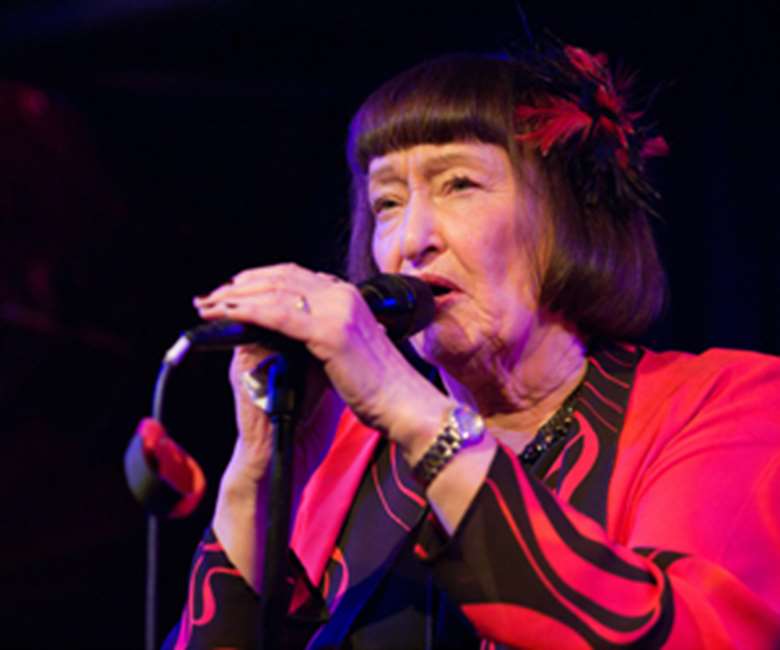Sheila Jordan masterful and meaningful at Ronnie Scott's
Friday, August 22, 2014
Sheila Jordan is a real nightclub singer.

Though she hasn’t touched a drink since 1986, the clink of glasses at the bar at Ronnie’s is the natural ambience for a voice that makes you lean in to listen. Hers is a reserved art, calibrated to preserve precision and, aged 85, it’s hard to find a missed note or emotional nerve untouched.
This eternal bohemian would look hip any time from Louise Brooks’s to now, with her brunette bob and Chinese peacock-patterned, glistening-beaded dress. The singer who Charlie Parker complimented on her “million-dollar ears” made few recordings even in middle-age – a rare Blue Note vocal LP, Portrait of Sheila (1962), and Playground (1979) with Steve Kuhn on ECM stand out. Audiences took their time getting hip to her, but her second night at Ronnie’s is packed.
“Every year I get an inch shorter. I’ll be crawling…” she wisecracks as she slips on stage to join the Brian Kellock Trio. The good humour rarely lets up, nor the casual mention of icons of the bop era to which she’s a steely connecting bond. She begins with ‘The Bird’, recalling a time when you’d hear Parker’s name “every day”, her vocal a sort of musical speaking which name-checks Roy Haynes and her ex-husband Duke Jordan, too. Her exact contemporary Horace Silver, who she gave “a new piano” to one long ago day and died in June, gets a heartfelt send-off with his song ‘Peace’.
Jordan can be antic, and relishes the humorous, quickfire lyrics to her upstate New York neighbour Sonny Rollins’ ‘Pent-up House’. But she is straight, warm and close-up with ballads. When she eases back into Irving Berlin’s ‘How Deep Is the Ocean’ after the Trio’s solos, "How much do I love you?" is a quiet, serious question. “Why turn a dream to dust?” she asks on ‘If I Should Lose You’, holding us with her intimate inquisition of a lyric which fears a partner’s death. She snaps that into an up-tempo scat in which she takes the tenor sax role, before an improbable breeze into the upper register. Potential vocal crashes are pulled out of with a veteran bop pilot’s ease, rough throatiness deployed deliberately. Behind her, the band supply a bluesy bop base, John Rae all brushes and cymbal-taps. This is soft work, barely needing amplification.
‘The Moon’s A Harsh Mistress’ draws on Jordan’s Native American background, starting with a sort of sacred American scat. Kellock supplies tidal piano ripples as she bites on the word “harsh”, like something bitter. An autobiographical song takes her from life as a Pennsylvania coalminer’s granddaughter to the epiphany when Bird opened the door of a Detroit club so the 14-year-old, then known to her friends as Jeannie Dawson, could hear him in the alley outside. She gives the word “rarely” incantatory power here.
Jordan’s pushing the two-hour mark, having already led an afternoon vocal workshop, when she encores with a song-suite from her time with Steve Kuhn, weaving Gordon Jenkins’ ‘Good-Bye’ into ‘Anything Goes’. Jenkins wrote the song after the death of his first wife, and saw it immortalised on Frank Sinatra Sings For Only the Lonely. Jordan the heartbreaking torch singer holds the mic-stand with a lover’s familiarity as she sings, “kiss me as you go”.
Around midnight, wrapped in a fur coat and ready to hit the street from the club once again, she pauses to admire a tune from the late show’s Brandon Allen Quartet. “If it wasn’t for jazz music, I wouldn’t be alive today,” she said earlier, and it was clearly the truth. Jordan’s still lost in and living the music as her next day begins.
– Nick Hasted